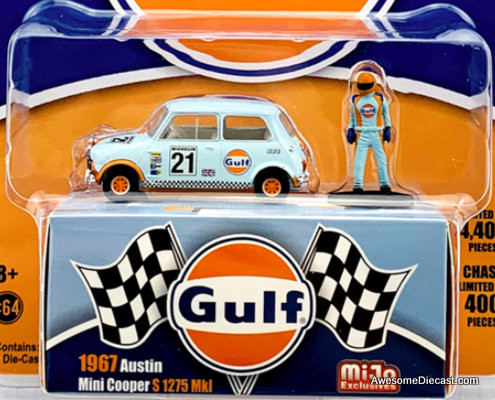Mini is a British automotive marque, owned by BMW since 2000, and used by them for a range of small cars. The word Mini has been used in car model names since 1959, and in 1969 it became a marque in its own right when the name "Mini" replaced the separate "Austin Mini" and "Morris Mini" car model names. BMW acquired the marque in 1994 when it bought Rover Group (formerly British Leyland), which owned Mini, among other brands.
The original Mini was a line of British small cars manufactured by the British Motor Corporation, and its successors. Their models included the Morris Mini-Minor and the Austin Seven, the Countryman, Moke, 1275GT and Clubman.[6] Performance versions of these models used the name Cooper, due to a partnership with racing legend John Cooper. The original two-door Mini continued in production until 2000. Development of a successor began in 1995 and the new generation car was launched in 2001. The current Mini range includes the Hardtop/Hatch/Convertible (three-door hatchback), Clubman (estate), Countryman (five-door crossover), Coupe/Roadster and Paceman (three-door crossover based on the Countryman).
The Mini was originally a product of the British Motor Corporation, which in 1966 became part of British Motor Holdings. British Motor Holdings merged with Leyland Motors in 1968 to form British Leyland. In the 1980s, British Leyland was broken-up and in 1988 Rover Group, including Mini, was acquired by British Aerospace. In 1994, Rover Group was acquired by BMW. In 2000, Rover Group was broken up by BMW, with BMW retaining the Mini brand.
All Mini models since 2001 have different variants, including One (entry-level), Cooper, Cooper S (sporty), and John Cooper Works (JCW) (high-end).
The hatchback/hardtop Mini was the first model of the new generation Mini, introduced in 2001, and was back then known as simply Mini. It was available in Cooper, Cooper S and One variations at launch. In many European markets, the Mini One was powered by a 1.4 litre I4[38] version of the Tritec engine but all other petrol powered Minis used the 1.6 litre I4 version. The Cooper S and JCW models included a supercharger intake system. This generation of minis was the only production model to have one, replaced by a turbocharger from the second generation onwards.
The names Cooper and Cooper S followed the names used for the sportier version of the classic Mini, which in turn come from the involvement of John Cooper and the Cooper Car Company. The Cooper heritage was further emphasised with the John Cooper Works (JCW) range of tuning options that are available with the Mini. John Cooper also created a one-off racing model of the Mini Cooper S named the Mini Cooper S Works. This car featured many extras which help to improve performance, such as a racing exhaust and air filter as well as uprated suspension. The car also had one-of-a-kind 17-inch (430 mm) racing wheels.
The Mk I Mini One, Cooper and Cooper S used some version of the reliable, Brazilian-built Tritec engine, co-developed by Chrysler & BMW; the Mini One D used a Toyota-built 1ND-TV diesel engine. In August 2006, BMW announced that future engines would be built in the UK, making the car essentially British-built again; final assembly took place at Oxford, and the body pressings were made in nearby Swindon at BMW's Swindon Pressings Ltd subsidiary.
The last Mk I variant was the Mini Cooper S with John Cooper Works GP Kit: a light-weight, quasi-race-prepped John Cooper Works model. Hand-finished by Bertone in Italy, it was offered as a limited-production run of 2,000 cars during the 2006 model year, with 444 of those originally intended for the UK market (although ultimately, 459 were sold).
The Italian Job is a 2003 American heist action thriller film directed by F. Gary Gray and starring Mark Wahlberg, Charlize Theron, Edward Norton, Jason Statham, Seth Green, Mos Def and Donald Sutherland. An American remake of the 1969 British film, the plot follows a motley crew of thieves who plan to steal gold from a former associate who double-crossed them. Despite the shared title, the plot and characters of this film differ from those of its source material; Gray described the film as "an homage to the original."
Most of the film was shot on location in Venice and Los Angeles, where canals and streets, respectively, were temporarily shut down during principal photography. Distributed by Paramount Pictures, The Italian Job was theatrically released in the United States on May 30, 2003, and grossed over $176 million worldwide. Critical response was generally positive, with publications highlighting the action sequences








